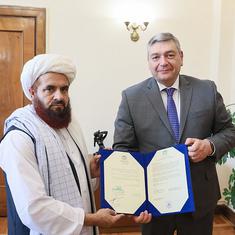Efforts by the Janata Dal (United) to replicate a Bihar-style mahagathbandhan for next year's Uttar Pradesh election are unlikely to yield the same results unless one of the state’s key regional players – the Bahujan Samaj Party or the Samajwadi Party – joins this grand alliance. However, both these parties have rejected the proposal.
Bihar Chief Minister Nitish Kumar, who is spearheading the effort, has so far persuaded smaller parties like the Rashtriya Lok Dal, Peace Party, Apna Dal, Mahan Dal and Suheldev Bharatiya Samaj Party to join the alliance for the 2017 Assembly elections in Uttar Pradesh. The Congress has not been formally approached but the Janata Dal (United) is assuming it will not object to partnering with these parties since it is already a member of a similar alliance in Bihar.
“We have talked to all the other parties and they have agreed to have a pre-poll alliance in Uttar Pradesh… we will also campaign together,” said KC Tyagi, general secretary of the Janata Dal (United). "As for the Congress, we are confident it will join us as this alliance is an extension of the Bihar partnership." A beginning in this direction, he said, has already been made with his party’s declaration of support to Ajit Singh’s Rashtriya Lok Dal in three Assembly by-elections in Uttar Pradesh.
Small players game
After the Bihar election results, Congress vice-president Rahul Gandhi had indicated that he was not averse to a similar alliance in Uttar Pradesh. He is also in agreement with the Janata Dal (United) proposal that the alternative alliance should focus on consolidating the non-Jatav vote among the Scheduled Castes and the non-Yadav vote among the Other Backward Classes since the Jatavs identify themselves with Mayawati’s Bahujan Samaj Party and the Yadavs are unwavering in their loyalty to the Samajwadi Party.
The political parties joining the new alliance are not major players in Uttar Pradesh but they hope the move to put up a combined fight will generate a momentum in their favour. “The parties may not have a large support base but when they decide to come together, it will send out a positive message,” remarked a Congress leader from Uttar Pradesh.
Dominant parties missing
However, it will be difficult to repeat the Bihar experience in Uttar Pradesh. The grand alliance worked in Bihar because its two major parties, the Janata Dal (United) and Lalu Prasad’s Rashtriya Janata Dal, together had a formidable vote share, while the Congress also chipped in. In the case of Uttar Pradesh, the proposed grand alliance does not have a dominant political force that is in a position to anchor the alliance.
Although the Congress will assume the lead role if it does join the alliance, it does not have the requisite presence in Uttar Pradesh to make a major difference on the ground. On the other hand, if the Bahujan Samaj Party or the Samajwadi Party join this alliance, their substantial support base will automatically alter the equation in favour of this new challenger. “It is important to have one dominant player which can play the role of an anchor if an alliance is to succeed,” remarked a senior Congress leader.
In this case, the two dominant political parties in Uttar Pradesh – the Bahujan Samaj Party and the Samajwadi Party – are unwilling to join the grand alliance. Mayawati has been firm on fighting her electoral battles alone so that she can maximise her gains in the elections to be able to drive a hard bargain in case she has to opt for an alliance after the elections.
Mayawati’s options
The Bahujan Samaj Party chief is not choosy about her post-poll partners (except for the Samajwadi Party) and will have no compunction in joining hands with the BJP in case the post-poll scenario requires such an alliance.
Mayawati has, in the past, formed a government with the BJP in Uttar Pradesh. She would, therefore, not like to close her options by aligning with the new alternative alliance now, especially since it has been positioned as a front aimed at halting the BJP juggernaut. Nevertheless, those leading the proposed alliance hope that Mayawati will be forced to look at them anew if they notch up a respectable score in next year’s assembly elections.
The Samajwadi Party ‘s announcement that it will not partner with any party is, at best, an act of bravado. Unlike the Bahujan Samaj Party, it is not the preferred choice of the new alliance. Its chief Mulayam Singh Yadav blotted his copybook when he walked out of the grand alliance in Bihar weeks before last year’s Assembly poll. Moreover, his party is thoroughly discredited after a term in office in Uttar Pradesh.
It is early to say if the Janata Dal (United)-inspired alliance will succeed in its mission to stop the BJP from spreading its wings, but the move to build such a partnership against the saffron party will certainly enhance Nitish Kumar’s profile. His own party has a negligible presence in Uttar Pradesh but Kumar has taken upon himself the task of bringing together political parties ideologically opposed to the BJP. In doing so, Kumar is proving his secular credentials and positioning himself for a larger political role on the national stage with an eye on the 2019 Lok Sabha polls.










